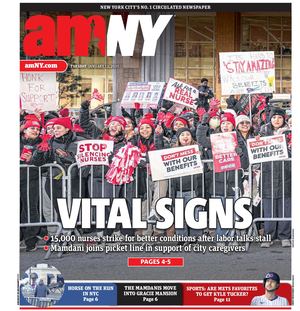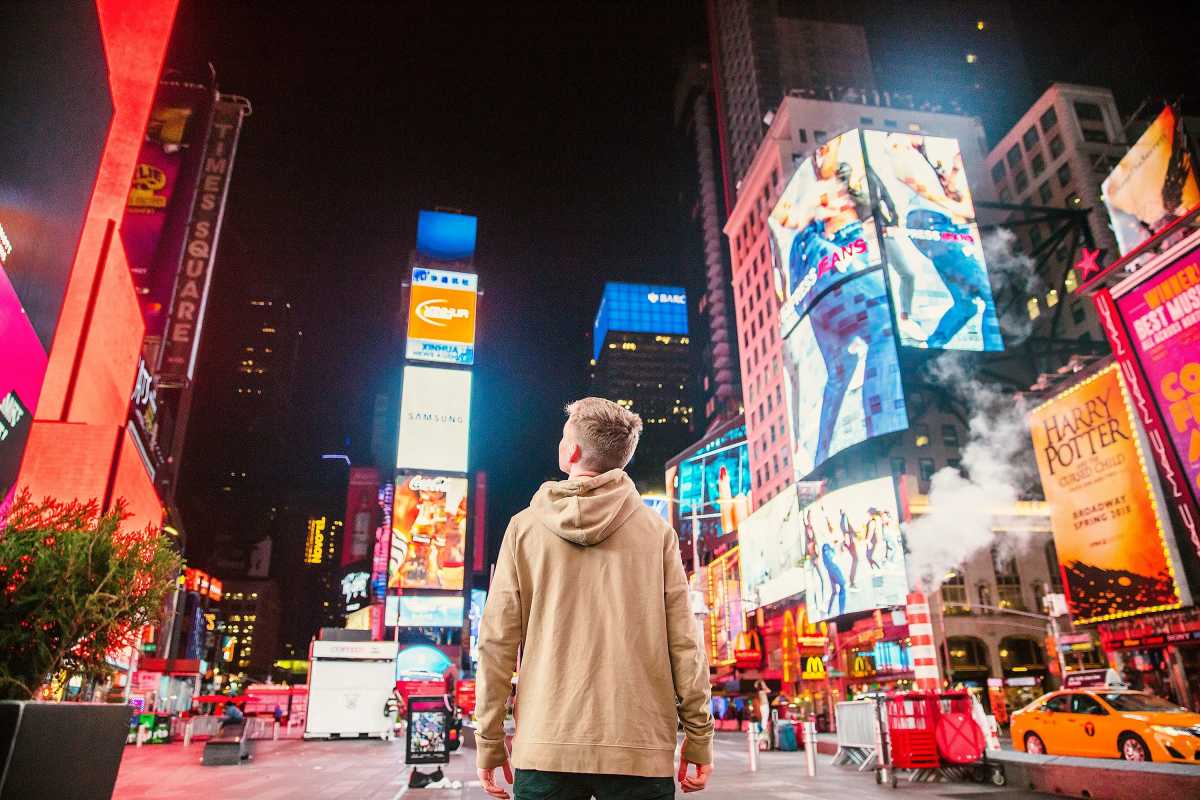A small number of protesters gathered at Citi Field Wednesday afternoon to campaign against the New York Mets’ use of facial recognition technology at ticket points throughout the baseball ground.
The protest, organized by Fight for the Future, Encode Justice NY and the Surveillance Technology Oversight Project (STOP), took place outside at around 12:30 p.m. on Wednesday, Aug. 21, just before the Mets’ 4-3 win against the Baltimore Orioles.
Campaigners distributed flyers to fans during Wednesday’s protest in a bid to spread awareness of the use of facial recognition technology at Citi Field.
They also delivered an open letter to the Mets calling for a ban of all biometric data collection at Major League sports stadiums. The letter was signed by 11 different human rights organizations, including Amnesty International, Access Now and Muslim Advocates.
Campaigners chanted slogans such as “steal bases, not faces” and “ban the scan”, while others carried banners calling for “no facial recognition on Mets fans.”
They also advocated for a number of bills to be passed that have been introduced in the City Council and State Legislature calling for a limit on the use of facial recognition technology by businesses.
In 2021, the New York Mets became the first team in Major League Baseball to introduce facial recognition technology, partnering with computer vision company Wicket to introduce facial ticket kiosks at every gate at Citi Field.
According to a statement on the Wicket website, fans can upload a selfie to the MLB website to register their face, allowing for “express” entry into Citi Field using facial recognition technology. Wicket states that fans can still opt to enter the stadium using mobile ticketing and that facial recognition ticketing is not available to fans aged 13 and under due to New York State laws.
The MLB has since introduced “Go Ahead Entry” at a number of baseball stadiums since the rollout of facial recognition technology at Citi Field, allowing Washington Nationals, Philadelphia Phillies, San Francisco Giants and Houston Astros fans to enter their respective stadiums using facial recognition ticketing.
Several other venues in different leagues and sports across the US also allow fans to enter using biometric or facial data, including Madison Square Garden and Yankee Stadium.
Protesters contended that any use of facial recognition technology is dangerous, describing facial recognition as a biased and broken technology that disproportionately affects people of color.
Hally Thornton, a campaigner with Fight for the Future, said many people are unaware about the long-term impacts of facial recognition technology and urged sports fans to fight back against the “overwhelming tide” before it becomes “unstoppable.”
“Facial recognition is an extremely biased and broken technology,” Thornton said. “The stats in terms of how it misidentifies people of color, and women of color especially, are just staggering. A lot of times, people give up their privacy for something that’s a little more convenient. People still have this preconceived notion that facial recognition technology can be good for stopping criminals. We’re trying to spread awareness of the fact that the technology actually doesn’t do that.”
She said facial recognition is harmful and dangerous to the general public, stating that the technology can potentially lead to arrests based on false identification.
Marisa Syed, an intern with Fight for the Future, said there are fairer and more transparent ways of improving ticketing systems at venues across the country.
“We have to ask ourselves if the convenience is worth the potential harm,” Syed said. “Citi Field could be a place where everyone feels comfortable and included.”
David Siffert, Legal Director at STOP and a lifelong Mets fan, said it was a hard pill to swallow to see facial recognition technology introduced at Citi Field.
“[The Mets] don’t always win, but they’ve always been a likable team,” Siffert said. “To see them do something unethical, that hurts.”
Siffert said Wednesday’s protest aimed to educate fans about facial recognition technology and raise awareness about the issue. He added that he hopes the Mets will reverse their decision to use the technology if enough fans come out against it.
“I think ultimately, when the fans understand what they’re giving up, the Mets will see that this is not a system that fans want.”
Albert Fox Cahn, founder and executive director of STOP, called on the Mets to be a leader by abandoning facial recognition and “showing what a privacy protective stadium can look like”.
Fox Cohn also called on lawmakers to take action against the technology, but said private businesses such as the New York Mets should not wait to “do the right thing” until it is required by law.
“The way that we’ve always seen civil rights changes unfold historically is by having institutions that are brave enough to lead the way, showing a better model of how to do business before it eventually becomes the law for everyone,” Fox Cahn said.
STOP and Fight for the Future have worked with New York Council Members Shahana Hanif and Jennifer Gutiérrez to draft a bill which, if passed, would limit the use of identification technology including facial recognition at businesses. A second bill introduced by Carlina Rivera, Pierina Ana Sanchez and Tiffany Cabán would limit the use of identification technology in residential buildings.
Campaigners called for both bills to be passed during Wednesday’s rally.
Mets fans were generally supportive of Wednesday’s protest, with dozens of fans stopping to engage with protesters on the issue.
The vast majority of fans were unaware that facial recognition is in use at Citi Field, with many expressing concerns about the technology.
The Mets did not immediately respond to a request for comment regarding Wednesday’s protest.
Campaigners additionally said they have not received any communications from the Mets so far. However, they hope that enough fans will sign an online petition calling for a ban on facial recognition in order to open dialogue with the Mets on the issue. They also hope that fans will write to their local elected officials, encouraging them to support any bills calling for a ban on the technology.
Fight for the Future campaigners said they will also hold future protests against facial recognition technology.
Fox Cahn also vowed to continue to apply pressure on the Mets to ban facial recognition technology.
“We’re going to keep the pressure up and keep pushing for long-overdue protections.”





































